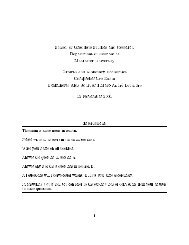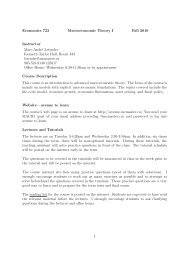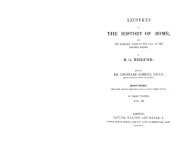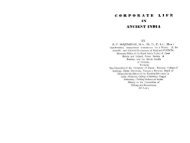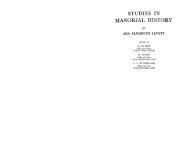?sal fic- what was in reality a breach of continuity: in both it wastlons.found necessary to pass over the immediate heir, so thatParliament had not merely, as in the case of Edward 11,to claim the right of setting aside <strong>an</strong> unworthy king, buthad implicitly to make the further claim to regulate thehfally were succession. So on both occasions probably m<strong>an</strong>y wereled furtherth<strong>an</strong> they carried by the course of events further along the path ofhad in- revolution th<strong>an</strong> they had intended. <strong>The</strong>re were m<strong>an</strong>y whotended.would gladly have seen Henry restored to his Duchy ofL<strong>an</strong>caster, <strong>an</strong>d who were prepared heartily to support himin insisting that Richard should ab<strong>an</strong>don his recent unconstitutionalproceedings <strong>an</strong>d return to his former mode ofgovernment, who yet felt themselves duped, when theyfound that he used the opportunity which they had givenhim to seat himself on the throne. So too there werem<strong>an</strong>y who were truly <strong>an</strong>xious that by me<strong>an</strong>s of the comingof the Prince of Or<strong>an</strong>ge the religion, laws, <strong>an</strong>d libertiesof Engl<strong>an</strong>d should be securely established in a free parliament,but who were disappointed when James 11'spusillallimity paved the way for the elevation of his sonixenry<strong>an</strong>din-law to the crown. Both Henry <strong>an</strong>d William came as\\ i111~1nc,,Ee the deliverers of a church which was threatened alike intleliverels doctrine <strong>an</strong>d in property by a hostile form of religion, <strong>an</strong>dof Chn~chI , of a nation perplexed <strong>an</strong>d unsettled by a feverish attempt"o".at arbitrary rule. In both cases questions of foreign policyForcignPO~,LY.had much to do with the result. But whereas at the closeof the seventeenth century it was absolutely necessary for thesalvation of Europe that Engl<strong>an</strong>d should be rescued fromher subservience to Fr<strong>an</strong>ce, at the close of the fourteenthcentury, on the other h<strong>an</strong>d, Fr<strong>an</strong>ce was by no me<strong>an</strong>s ad<strong>an</strong>gerous power. It was her very weakness which temptedthe unscrupulous <strong>an</strong>d hypocritical aggression of Henry V.<strong>The</strong>ory of In both cases one of the chief adv<strong>an</strong>tages secured by theroyalty.ch<strong>an</strong>ge of dynasty was that the royal authority was placedupon a proper footing, <strong>an</strong>d seen to rest upon the consent ofthe nation. Richard 11, like James 11, had imbibed <strong>an</strong>entirely baseless view of English monarchy. <strong>The</strong> assertionthat he had declared the laws to be in his own mouth <strong>an</strong>dbreast, is <strong>an</strong> exaggeration of his enemies: but iftrue, such l<strong>an</strong>guage is no worse th<strong>an</strong> James 11's prattleabout 'his sovereign authority, prerogative royal, <strong>an</strong>dabsolute power, which all his subjects were to obey withoutreserve'.' By the ch<strong>an</strong>ge of dynasty theories of thiskind were got rid of. Whether from choice or fromnecessity, the L<strong>an</strong>castri<strong>an</strong>s always professed to rule as constitutionalkings.<strong>The</strong> L<strong>an</strong>castri<strong>an</strong> period must always be of import<strong>an</strong>ce, Importasthe period in which political liberty, at <strong>an</strong>y rate in <strong>an</strong>ce of theL<strong>an</strong>castritheory,reached its highest point during the middle ages. <strong>an</strong> period.In fact the people acquired a larger measure of liberty th<strong>an</strong>they were able to use: <strong>an</strong>d the Commons, though boldin stating their griev<strong>an</strong>ces, were often helpless in devisingremedies. In the words of Dr. Stubbs, ' Constitutionalprogress had outrun administrative order2.'And this,combined with other causes which will be noticed later,made possible those disturb<strong>an</strong>ces which culminated in thecivil war, <strong>an</strong>d which wearied out the national patience,until even Tudor despotism seemed more tolerab!e th<strong>an</strong>confusion.<strong>The</strong> adv<strong>an</strong>tages of L<strong>an</strong>castri<strong>an</strong> rule were mainly prospec- Its adtive,<strong>an</strong>d its chief claim on our gratitude is the fact that it z:nysupplied the precedents on which the constitutional pnrty in prospectheseventeenth century based their resist<strong>an</strong>-tive.~e to that caricatureof Tudor despotism which the Stuarts attempted toperpetuate? Viewed in relation to contemporary history itwas prenlature ; <strong>an</strong>d it combines with the fruitless rising ofthe Hussites in Bohemia, with the abortive attempts of theChurch to reform itself in the Councils of Pisa, Const<strong>an</strong>ce,<strong>an</strong>d Basle, <strong>an</strong>d with the equally abortive attempts torestore administrative <strong>an</strong>d constitutional unity to the disintegratedGerm<strong>an</strong> Empire, to stamp upon the fifteenththat character of futility which has becn SO justlyascribed to it4.Hallam, Const. Hist. iii. 71. ' Weak as is the fourteenth' Stubh~, Const. Hist. iii. 269. century, the fifteenth is weakerS. C. H. iii. 2-5 ; cf. Rogers' still ; more firtde, more bloody,Gascoigne, pp. lviii; ff. more immoral.' S. C. H. ii. 624.B 2
Key-note ' <strong>The</strong> key-note of the L<strong>an</strong>castri<strong>an</strong> policy,' says Dr.of L<strong>an</strong>castri<strong>an</strong>Stubbs, 'was struck by Archbishop Arundel in Henry IV's~'olicy, its first Parliament, when he declared that Henry would beappeal tona~ional governed, not by his own "singular opinion, but by com-'Onsent. mon advice, counsel, <strong>an</strong>d consent l."' For the tendering ofthis 'common advice, counsel, <strong>an</strong>d consent,' there wereduring this period three org<strong>an</strong>s: 1. <strong>The</strong> Privy Council ;Privy 2. <strong>The</strong> Great Council ; 3. <strong>The</strong> Parliament. On theCouncil.character <strong>an</strong>d composition of the Privy Council duringthe L<strong>an</strong>castri<strong>an</strong> period, <strong>an</strong>d the schemes of Fortescue forGreat reorg<strong>an</strong>izing it, I have spoken at length elsewhere2. OnCouncil.the Great Council also something will be found in thesame place. Fortescue says nothing about it; perhaps, asI have there suggested, he disliked the institution as givingtoo much influence to the aristocracy. It forms howevera characteristic feature of L<strong>an</strong>castri<strong>an</strong> rule : for whereasin former reigns it appears as a mere survival of the oldbaronial parliaments, it now assumes special functions <strong>an</strong>da special position of its own, st<strong>an</strong>ding midway <strong>between</strong> thePrivy Council <strong>an</strong>d the Parliament, advising on matterswhich the former did not feel itself competent to settle, <strong>an</strong>dpreparing business for the meeting of the latter.ParIia- On the composition <strong>an</strong>d powers of Parliament Fortescuement.is also silent. Probably he considered them to be toofirmly settled <strong>an</strong>d too well known to require <strong>an</strong>y commentary.<strong>The</strong> increase of the power of parliament underthe L<strong>an</strong>castri<strong>an</strong>s is indeed too obvious to escape notice.' Never before,' says Dr. Stubbs, ' <strong>an</strong>d never again for moreth<strong>an</strong> two hundred years, were the Commons so strong asthey were under Henry IV"'Henry IV Henry IV came to the throne as the representative ofa Saviourof society. the ' possessioned ' classes--to use a contemporary expression4.<strong>The</strong> crude socialism of the Lollards, as the baronssaw, <strong>an</strong>d as the Churchmen were careful to point out,threatened the foundations not merely of the Church, butof all property. It was the mission of Henry IV to putS. C. H: iii. 14 S. C. H. iii. 72.Wotes to Chap. xv. below. ' Sharon Turner, iii. 105.down these <strong>an</strong>archical tendencies, to maintain vested interests<strong>an</strong>d the existing state of things. He came, in modernphrase, as a saviour of society. Richard 11, even in hisbest days, had not been very favourable to the interests ofthe propertied classes. He had not been forward in persecutingthe Lollard, <strong>an</strong>d he had wished to give freedom tothe serf. <strong>The</strong>se errors Henry was expected to correct.<strong>The</strong> second great object of Henry's reign was the main- Histen<strong>an</strong>ce of himself on the throne <strong>an</strong>d the continu<strong>an</strong>ce ofhis dynasty. From this point of view his reign was one himself.long struggle against foreign <strong>an</strong>d domestic enemies. Hisultimate success is a proof of his great ability, but he wasat no time free from <strong>an</strong>xiety. Hallaml sgeaks as ifHenry IV's submission to the dem<strong>an</strong>ds of the Commonswas unaccountable. But the causes of his weakness areplain enough. He was weak through his w<strong>an</strong>t of title,weak through the promises by which he had bound himselfto those whose aid had enabled hinl to win the crown,weak most of all through his w<strong>an</strong>t of money. It was this Hiswhich gave the Comnlons their opportunity, it was this pOve*y.which caused all the disasters of the reign, the rebellion ofthe Percies, the ill-success of the Welsh campaigns, thewretched state of Irel<strong>an</strong>d, the d<strong>an</strong>ger of Calais. <strong>The</strong> most' exquisite me<strong>an</strong>s '-to use Fortescue's phrase-of raisingmoney were resorted to; the constitutional character ofsome of them being, to say the least, questionable. Thisscarcity of money was due partly to the general w<strong>an</strong>t of Reqctionagalnstconfidence in the stability of the government which suc- him.ceded the brief enthusiasm in Henry's favour2, <strong>an</strong>d whichl Middle Ages, iii. 95.<strong>The</strong> letter of Philip Repingdon,the King's confessor, afterurdsBishop of Lincoln, datedMay 4, 1401, is worthy of careful~tudy In regard to this point. ItIS no mere rhetorical cornpositionmade up of phrases al\\ays kept1" stock <strong>an</strong>d not intended to fit"?Y thought in particular ; but itgibes a genuine picture of the un-Satisfactory state of the country,<strong>an</strong>d of the deep disappointmentfelt at the way in \vhich Henryhad belied the (perhaps unreasonablyhigh) expectations that hadbeen formed of him. <strong>The</strong> authoralludes in reference to Henry toLuke xuiv. 2 I, ' Nos autein sperabamusquia ipse esset redernpturusIsrael.' Bekynton's Correspondence,i. I 51-4 ; cf. also Engl.Chron., ed. Davies, pp. 23,28, 31 ;Hardyng, p. 371.
- Page 1 and 2: OTHER WISE CALLEDThe Difference bet
- Page 3 and 4: THE work here presented to the read
- Page 5 and 6: preface. preface, xihistorical bear
- Page 7 and 8: NOTE.-AS a general rule the authori
- Page 9 and 10: xviii CLbconological Cable, QLbrono
- Page 11: INTRODUCTION.PART I.TIIE fifteenth
- Page 15 and 16: 3(n troduction,His reign only as de
- Page 17 and 18: directed, and they must therefore b
- Page 19 and 20: crimes from punishment'. This evil,
- Page 21 and 22: Perversionof justice.Localoffice1 S
- Page 23 and 24: Influence use their local power to
- Page 25 and 26: houses of Parliament an oath agains
- Page 27 and 28: Tumber of action lay1. One cause of
- Page 29 and 30: The House been judged in history fo
- Page 31 and 32: does not involve the acquittal of t
- Page 33 and 34: life as ahnrrister.become possessed
- Page 35 and 36: ford Castle a prisoner named Thomas
- Page 37 and 38: Anarbitra- Wentworth and Sir John F
- Page 39 and 40: The Lancastriansretirenorthwards.Ag
- Page 41 and 42: which they said was ruining the cou
- Page 43 and 44: Illterview way alone. At Bdthune th
- Page 45 and 46: feelings the exiles received the ne
- Page 47 and 48: Requiredto write infavour ofthe Yor
- Page 49 and 50: Other come down to us for the most
- Page 51 and 52: And moche good truly gotyn hath bee
- Page 53 and 54: Date.The DeI.arrcfi6usLegurnA uglii
- Page 55 and 56: The RIS. is well and correctly writ
- Page 57 and 58: cording to Mr. Thompson, is of the
- Page 59 and 60: I'robably On the whole, the second
- Page 61 and 62: Aquinas, six I have failed to trace
- Page 63:
Fortescue'scontemporaries.Littleton
- Page 66 and 67:
sithpn thai had a kynge, wich was G
- Page 68 and 69:
that cause and for gret necessite w
- Page 70 and 71:
such meane. And yet of necessite th
- Page 72 and 73:
and sqviers, and oper, in also gret
- Page 74 and 75:
or by lande, pe kyng most encomptre
- Page 76 and 77:
grettest lordes off Englond, rose a
- Page 78 and 79:
as hynl liste. And by discente per
- Page 80 and 81:
haue wherwith to bie hem bowes, arr
- Page 82 and 83:
Ther is no man hanged in Scotlande
- Page 84 and 85:
e kyng be counsellyd to restrayne g
- Page 86 and 87:
pe Romans, but also is hyghnes shal
- Page 88 and 89:
muned and del~bered with his fforsa
- Page 90 and 91:
CRITICAL NOTES.CHAPTER I.P. 109. 1.
- Page 92 and 93:
Bfbe bobernance of QEnfiian'tr,CHAP
- Page 94 and 95:
1. 24. parcial] parcialite L (from
- Page 96 and 97:
for granting taxes was the same as
- Page 98 and 99:
moral philosophy, but consists of a
- Page 100 and 101:
are brought about by the sin of man
- Page 102 and 103:
note$+ QLbap. ii,regendo: non autem
- Page 104 and 105:
note$+ CCbap, ii,up in the most une
- Page 106 and 107:
Later statutes fixed the limit of l
- Page 108 and 109:
&be bobernanre of QEngIanD*applied
- Page 110 and 111:
of the household of George Duke of
- Page 112 and 113:
RgidiusRumanus.. . . homines sibi s
- Page 114 and 115:
note see Janet, i. 35 1-373, 396,42
- Page 116 and 117:
'Ordinaryand extraordinaryexpenditu
- Page 118 and 119:
p----p---3723ESTIMATED EXPENDITURE.
- Page 120 and 121:
pestifera.' Very possibly Fortescue
- Page 122 and 123:
i the clerkys off theschekquer.] Be
- Page 124 and 125:
eciting how 'the seid Duc . . . lat
- Page 126 and 127:
was defined by Parliament in 4 Edwa
- Page 128 and 129:
punish ' piratas et spoliatores mer
- Page 130 and 131:
marchandyse is lost, . . . the see
- Page 132 and 133:
Transition pensiononmg, as it was d
- Page 135 and 136:
@Lbap+ bii,commiscomissioners in gr
- Page 137 and 138:
ap1-0,Bterc,cjzt4IjAnd on the other
- Page 139 and 140:
Charleshlartel.Fall of theCarolingi
- Page 141 and 142:
the Abbey of S. Albons' (July: Past
- Page 143 and 144:
York, married Constance and Isabell
- Page 145 and 146:
Taxon France, ii. 526, 533-4, 547,
- Page 147 and 148:
499 b). And no less than ~o,ooo mar
- Page 149 and 150:
which was probably in Fortescue's m
- Page 151 and 152:
holders of such grants are however
- Page 153 and 154:
286 Cbe Booernance of Qngianb.exter
- Page 155 and 156:
teristic of the Lancastrian times,
- Page 157 and 158:
such a contenuall counsell.] ' The
- Page 159 and 160:
character which the council might p
- Page 161 and 162:
which can not counsele hym' (Append
- Page 163 and 164:
306 &be bobernance of QEnglanD.'whe
- Page 165 and 166:
Sicque horum mediis concessit tande
- Page 167 and 168:
Ebe bobernance of QEngland.qualific
- Page 169 and 170:
Controlof the exchanges.Jealousyof
- Page 171 and 172:
during good behaviour. The Master o
- Page 173 and 174:
Cbe Qiobernance of QEngIand,says: '
- Page 175 and 176:
should be Justice, Chamberlain, Cha
- Page 177 and 178:
Offices per- system of executing of
- Page 179 and 180:
Defined by (e.g. Rot. Parl. v. 2 73
- Page 181 and 182:
have been detailed in the notes to
- Page 183 and 184:
of Sir Harris Nicolas there). This
- Page 185 and 186:
iiij. lordis temporelx, or in lasse
- Page 187 and 188:
y a pretensed title, saying he ys d
- Page 189 and 190:
'every broker, brogger, andhuckster
- Page 191 and 192:
suffre, suffer, 152. 14 ; soeffre,
- Page 193 and 194:
Cade, rising of, pp. 11, 284; hisco
- Page 195 and 196:
~ .-.~--hopes entertained of him, p
- Page 197 and 198:
Franchise, question of, in medizval
- Page 199 and 200:
Loans raised by the government,pp.
- Page 201:
Pisa, Council of, p. 243. .Pitt, se



